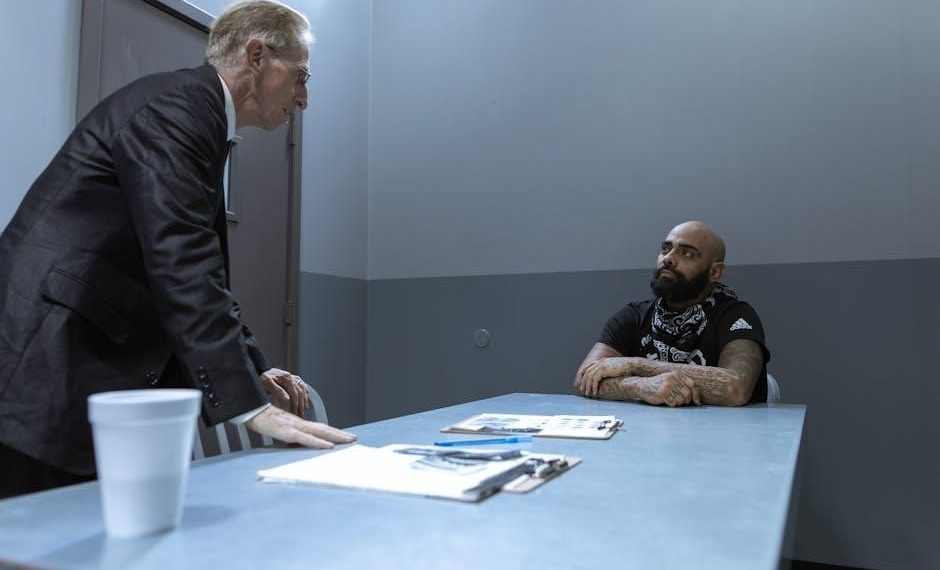hacking the case interview pdf
Hacking the Case Interview by Taylor Warfield offers a concise guide to mastering consulting interviews. It provides frameworks, techniques, and strategies to prepare efficiently for top consulting firms.
What is Hacking the Case Interview?
Hacking the Case Interview is a comprehensive guide designed to help aspiring consultants master case interviews efficiently. Authored by Taylor Warfield, this resource provides a structured approach to understanding and excelling in consulting interviews. It focuses on frameworks, problem-solving techniques, and strategies to break down complex business problems into manageable components. The guide is tailored for individuals aiming to secure roles at top consulting firms like McKinsey, BCG, and Bain. Unlike traditional methods, it offers a shortcut to learning, ensuring maximum knowledge retention in minimal time. The book is complemented by a comprehensive case interview course that promises to save over 100 hours of preparation time. Its popularity stems from its practical, no-fluff approach, making it a go-to resource for those seeking to confidently navigate the competitive consulting interview process. It’s available in both book and online course formats, catering to diverse learning preferences.
Importance of Case Interviews in Consulting
Case interviews are a cornerstone of the consulting recruitment process, serving as a critical assessment tool for evaluating candidates. They mimic real-world consulting scenarios, allowing firms to gauge problem-solving skills, analytical thinking, and communication abilities. These interviews are essential for top firms like McKinsey, BCG, and Bain, as they help identify candidates who can thrive in high-pressure environments. The ability to structure and solve complex problems, often under time constraints, is a key indicator of potential success in consulting. Hacking the Case Interview emphasizes that mastering this format is vital for standing out in a competitive field. By simulating client challenges, case interviews ensure that consultants are prepared to deliver impactful solutions. Thus, excelling in case interviews is not just about securing a job but also about demonstrating readiness to tackle real-world business problems effectively.
Overview of the Book by Taylor Warfield
Hacking the Case Interview by Taylor Warfield is a concise, results-driven guide designed to help aspiring consultants master case interviews efficiently. The book focuses on delivering maximum knowledge in minimal time, making it an essential resource for those aiming to break into top consulting firms like McKinsey, BCG, and Bain. It provides step-by-step frameworks, practical strategies, and real-world examples to simplify complex problem-solving. Warfield emphasizes actionable insights, ensuring readers can confidently tackle case interviews. The book is available in PDF format, offering accessibility and convenience for learners. By prioritizing clarity and efficiency, Hacking the Case Interview has become a go-to resource for consulting hopefuls seeking to stand out in a competitive field. Its straightforward approach ensures readers are well-prepared to secure their desired roles.

Key Frameworks for Case Interviews
Key frameworks in case interviews include tools like issue trees, SWOT analysis, and Porter’s Five Forces. These structured approaches help break down complex problems into manageable components for clear, logical solutions.

Understanding the Case Interview Framework
Understanding the Case Interview Framework is crucial for success in consulting interviews. It involves learning structured approaches to analyze business problems, such as issue trees, SWOT analysis, and Porter’s Five Forces. These frameworks help break down complex scenarios into smaller, manageable parts, enabling candidates to present clear and logical solutions. Taylor Warfield’s book emphasizes the importance of mastering these tools to tackle various case types effectively. By practicing these frameworks, aspiring consultants can improve their problem-solving skills and communicate their ideas with confidence during interviews. The key is to apply these structures flexibly and adapt them to different business contexts, ensuring a thorough and insightful analysis every time.
Structuring and Breaking Down Complex Problems
Mastering the ability to structure and break down complex problems is a cornerstone of case interviews. This involves using frameworks like issue trees, SWOT analysis, and Porter’s Five Forces to dissect challenges into manageable components. Taylor Warfield’s guide emphasizes the importance of starting with a clear hypothesis to guide the analysis, ensuring a focused and logical approach. By systematically identifying key drivers and relationships, candidates can uncover root causes and develop actionable recommendations. The goal is to present solutions that are both insightful and easy to follow, demonstrating analytical rigor and clarity of thought. This skill is essential for impressing consulting firms and achieving top consulting roles.
Essential Problem-Solving Techniques
Essential problem-solving techniques in case interviews involve logical thinking, creativity, and structured analysis. Taylor Warfield’s guide highlights tools like the 80/20 rule, which identifies key drivers of issues, and decision trees for evaluating options. Candidates learn to quantify data, perform quick mental math, and synthesize information effectively. Active listening and probing questions are emphasized to gather insights and tailor solutions. Additionally, Warfield underscores the importance of storytelling to present findings compellingly. These techniques empower candidates to tackle diverse cases with confidence, showcasing their ability to think critically and deliver results under pressure. Mastering these methods is crucial for standing out in competitive consulting interviews and demonstrating readiness for real-world challenges in top firms.

Practice Cases and Strategies
Hacking the Case Interview provides real-world examples and practical strategies for mastering consulting cases. It offers hands-on practice, enabling candidates to refine their approach and prepare efficiently for interviews.
Types of Case Interview Questions
Case interview questions vary widely, covering market sizing, financial analysis, operational problems, and strategic decisions; Each type requires unique approaches and frameworks. For example, market sizing questions ask candidates to estimate market potential, while financial analysis focuses on profitability and cost structures. Operational cases involve improving processes, and strategic cases explore competitive positioning. Taylor Warfield’s guide categorizes these questions, offering tailored strategies for each type. It emphasizes understanding the client’s perspective and applying structured methodologies. The book also includes practice exercises to refine skills in tackling different question types effectively. By mastering these categories, candidates can approach interviews with confidence and clarity.
Sample Practice Cases for Preparation
Hacking the Case Interview provides a wide range of sample practice cases to help candidates prepare effectively. These cases cover various industries, from retail and technology to healthcare and finance, ensuring broad exposure. Each case is designed to simulate real interview scenarios, allowing candidates to practice their problem-solving and communication skills. For instance, one case might involve advising a struggling retailer on profitability, while another could focus on market entry strategies for a tech startup. The book also includes detailed solutions and feedback, enabling candidates to identify weaknesses and improve. Taylor Warfield emphasizes the importance of practicing diverse cases to build confidence and adaptability. By working through these examples, candidates can refine their frameworks and develop a structured approach to tackling complex problems under time pressure.
Effective Strategies for Case Practice
Effective case practice involves adopting structured and intentional strategies to maximize learning. Taylor Warfield emphasizes the importance of active practice over passive learning, encouraging candidates to engage in mock interviews and case breakdowns. Breaking down problems into manageable components and practicing frameworks repeatedly helps build muscle memory. Timing oneself during practice ensures adherence to interview time constraints. Additionally, focusing on clear and concise communication is crucial, as consultants must articulate complex ideas simply. Regularly reviewing feedback and iterating on approaches further enhances preparation. By combining these strategies, candidates can develop a systematic approach to case interviews, ensuring they are well-prepared for the challenges posed by top consulting firms. Consistent and focused practice is key to mastering the skills required to excel in this demanding interview format.
Comprehensive Case Interview Course
A comprehensive case interview course is designed to streamline preparation, offering a structured approach to mastering consulting interviews. Taylor Warfield’s course provides a 7-day program that condenses extensive material, saving candidates over 100 hours of prep time. It includes video lessons, practice cases, and interactive exercises tailored to simulate real interview scenarios. The course focuses on essential frameworks, problem-solving techniques, and communication skills. By enrolling, candidates gain access to proven strategies and tools to tackle even the most complex cases with confidence. This course is particularly beneficial for those with limited time, ensuring they cover all critical areas efficiently. The structured learning path ensures a thorough understanding of consulting concepts, equipping participants to perform exceptionally in their interviews and secure coveted roles at top firms like McKinsey, BCG, and Bain.

Additional Learning Materials and Guides
Beyond the core book, Hacking the Case Interview offers a wealth of supplementary resources. These include video lessons, practice cases, and interactive exercises designed to deepen understanding. The book is complemented by an online course that provides structured learning paths and real-world examples. For those seeking extra support, there are downloadable guides and templates that outline key frameworks and strategies. Additionally, the author shares tips and insights through blogs and webinars, ensuring learners stay updated on best practices. These materials cater to diverse learning styles, offering a holistic approach to mastering case interviews. They are particularly useful for candidates who want to reinforce their knowledge and refine their skills outside of the main curriculum.
Online Communities and Forums for Support
Online communities and forums play a vital role in supporting candidates preparing for case interviews. Platforms like Reddit and LinkedIn host dedicated groups where professionals share insights, resources, and advice. These spaces allow learners to connect with peers, ask questions, and gain feedback on their progress. Additionally, specialized forums such as CaseInterview.com provide tailored discussions and resources specifically for consulting interviews. These communities often feature success stories, tips from industry experts, and strategies for overcoming common challenges. Engaging with these forums can enhance preparation and provide motivation. They also serve as a hub for accessing supplementary materials, such as practice cases and guides, recommended by experienced consultants. Leveraging these online resources can significantly strengthen one’s readiness for the case interview process.

Tips for Acing the Case Interview
Mastering case interviews requires strategic preparation. Focus on time management, avoid common pitfalls, and build confidence through practice. Use frameworks effectively to structure your responses clearly and logically.
Time Management During Interviews
Effective time management is critical during case interviews. Allocate time wisely to understand the problem, structure your approach, and communicate solutions clearly. Practice frameworks to break down complex issues quickly. Use mental math and estimation techniques to save time. Prioritize key insights over detailed calculations. Stay calm and adapt your pace based on the interviewer’s feedback. Rehearse timing strategies through practice cases to build confidence and efficiency.

Common Mistakes to Avoid
Candidates often make avoidable errors during case interviews. Overcomplicating the problem, poor structure, and lack of clarity are frequent pitfalls. Avoid rushing into solutions without understanding the question. Do not overlook key details or fail to prioritize issues. Practicing frameworks and mock interviews can help mitigate these mistakes. Stay organized, communicate clearly, and demonstrate logical thinking. Addressing these common errors enhances your performance and confidence during the interview process.

Building Confidence for the Interview
Confidence is crucial for acing case interviews. It stems from thorough preparation and understanding of consulting frameworks. Practice consistently to internalize problem-solving techniques, ensuring smooth execution during interviews. Engage in mock interviews to refine communication skills and adapt to various scenarios. Embrace a growth mindset, viewing each practice as an opportunity to improve. Self-assurance enhances your ability to articulate ideas clearly and think critically under pressure. Additionally, researching the firm and understanding the industry can bolster your confidence, making you a more compelling candidate. Remember, confidence is not just about knowledge but also about projecting self-assuredness and professionalism.
Hacking the Case Interview equips you with essential tools and strategies. Apply the frameworks, practice consistently, and enroll in the course to save 100 hours of prep time.

Recap of Key Points
Hacking the Case Interview by Taylor Warfield provides a streamlined approach to mastering consulting interviews, emphasizing frameworks, problem-solving techniques, and efficient practice strategies. The book is designed to teach more in one day than others do in a month, making it ideal for candidates aiming to break into top firms like McKinsey, BCG, and Bain. Key points include the importance of structured frameworks, time management, and avoiding common mistakes. The guide also offers a 7-day course to save 100 hours of preparation time, ensuring confidence and effectiveness in case interviews. By focusing on essential tools and consistent practice, candidates can navigate complex problems and excel in consulting interviews.

Final Thoughts on Preparation
Hacking the Case Interview underscores the importance of consistent practice and structured frameworks to excel in consulting interviews. The book by Taylor Warfield offers a shortcut guide, enabling candidates to master case interviews efficiently. By focusing on problem-solving techniques and time management, aspirants can build confidence and clarity. The comprehensive course and additional resources provided ensure a well-rounded preparation. Emphasizing the value of avoiding common mistakes, the guide equips candidates with the tools to approach complex problems systematically. Ultimately, Hacking the Case Interview serves as a valuable resource for those aiming to succeed in consulting interviews, offering a clear path to achieve their goals effectively.
Next Steps After the Interview
After completing the case interview, it’s crucial to follow up with a thank-you note to express gratitude and reaffirm interest in the position. Reflecting on the interview performance helps identify strengths and areas for improvement. If offered a position, carefully review the offer and negotiate terms if necessary. For those who didn’t secure the role, seeking feedback is essential to refine future preparation. Regardless of the outcome, continuous learning and practice are vital. Resources like Hacking the Case Interview by Taylor Warfield provide ongoing support, offering strategies to enhance skills and stay prepared for future opportunities. By maintaining momentum and applying lessons learned, candidates can continue to grow and improve their consulting interview performance over time.
